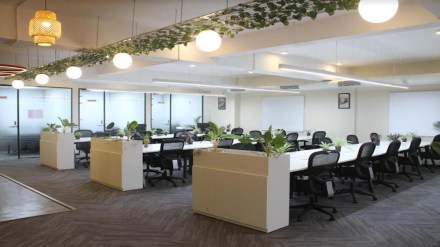In recent years, remote work has emerged as a viable and desirable option for many professionals worldwide. With advancements in technology and changes in work culture, the concept of working from anywhere has gained widespread acceptance. In India, both state governments and the co-working industry have been proactive in facilitating and promoting remote work opportunities.
Several state governments in India have recognized the potential benefits of remote work and have taken proactive measures to support it. One notable example is the government of Goa, which has introduced various initiatives to promote remote work in the state. Through policy incentives and infrastructure development, Goa indicates a promising trend for remote workers. The tourism department of the state has announced the establishment of co-working spaces on Morjim and Ashwem beaches, aligning with the Goa government’s vision to position the state as a tourism hotspot beyond its renowned beaches. This initiative not only enhances the remote work infrastructure in Goa but also offers professionals the opportunity to blend work and leisure in a picturesque setting.
Similarly, many other governments have stepped up efforts to support and facilitate business activities in their regions. Infrastructure development initiatives aimed at improving connectivity, accommodation facilities, and tourist amenities are underway, enhancing the overall visitor experience.
Also Read: 10 smart tips to cut costs while buying a new car in India
Kushal Bhargava, Co- Founder of MyBranch Services, says, “The collaboration between governments and the co-working industry is driving initiatives to enhance remote working opportunities. This underscores the diverse government initiatives aimed at boosting employment and shaping the co-working landscape to accommodate the expanding workforce across regions. From North to South, and from East to West, state governments are implementing tailored programs to encourage remote work adoption, spur job creation, and cultivate entrepreneurial ecosystems within co-working spaces. Through supportive policies and incentives, governments aim to cultivate an environment conducive to remote work, promoting flexibility and work-life balance.”
Remote work is increasingly sought-after worldwide, and India is no exception. “On the one hand, states like Goa are actively fostering environments conducive to remote work, recognizing its potential for economic growth. Their commitment to establishing co-working spaces reflects a broader trend of integrating remote work with leisure opportunities, providing professionals with an appealing blend of productivity and relaxation. On the other hand, the co-working industry is innovating to meet the evolving needs of remote workers, offering flexible memberships, virtual office solutions, and enhanced amenities to foster productivity and connectivity,” he added.
Aryann Suri, Director – Sales & Operations, Space Creattors Heights, says, “As the demand for remote work surges, the government and co-working industry are joining forces to pave the way for a flexible workforce. Initiatives like tax incentives for remote-friendly businesses and partnerships between co-working spaces and local authorities are fostering an environment where remote work is not just a perk, but a norm. By investing in infrastructure and promoting policies that support remote work, we’re empowering individuals to work from anywhere while boosting economic growth in regions beyond traditional urban hubs. This collaboration signifies a pivotal shift in how we view work, emphasizing adaptability and inclusivity in the modern workplace. Together, we’re creating a future where geography is no longer a barrier to career opportunities.”
In addition to government initiatives, the co-working industry in India has played a significant role in promoting remote work. Co-working spaces offer flexible and affordable alternatives to traditional office setups, making them ideal for remote workers and freelancers. Moreover, many co-working operators provide value-added services such as networking events, skill-building workshops, and mentorship programs, further enhancing the remote work experience. As remote work continues to gain momentum, collaboration between government and industry stakeholders will be crucial in ensuring its long-term success and sustainability.
